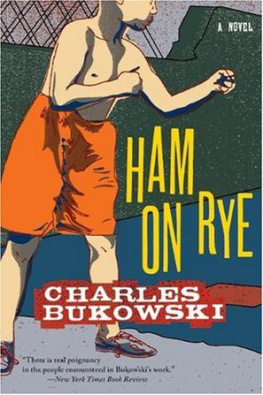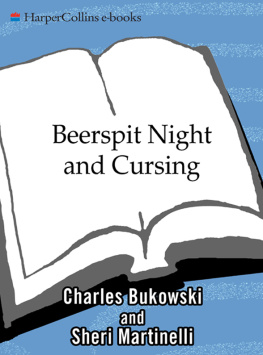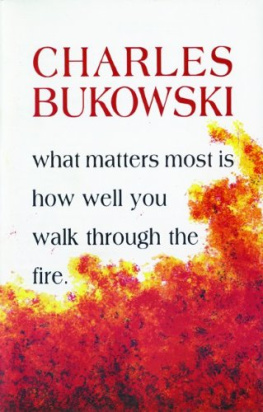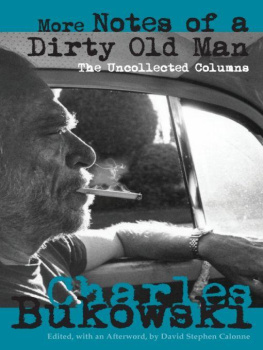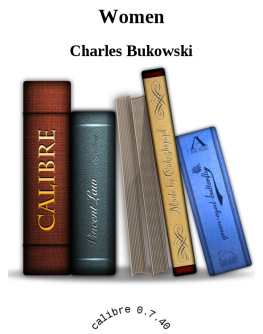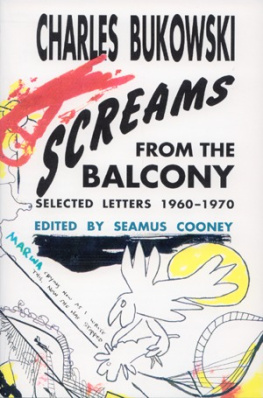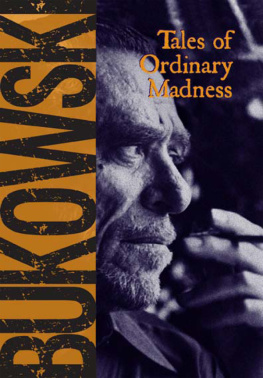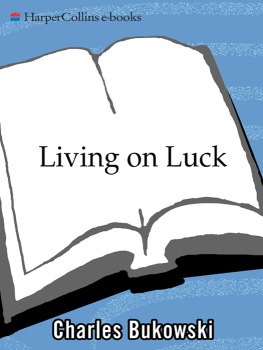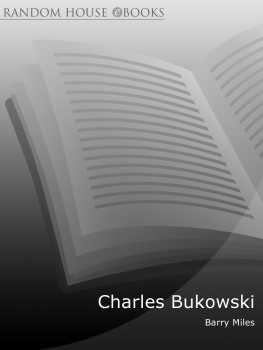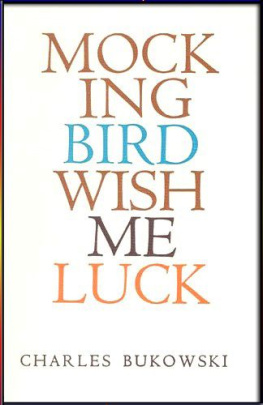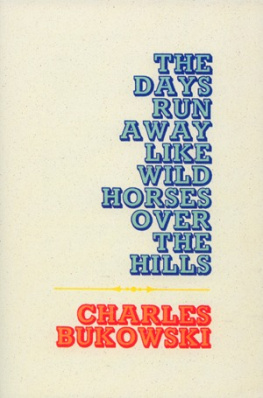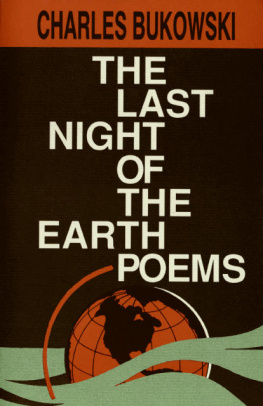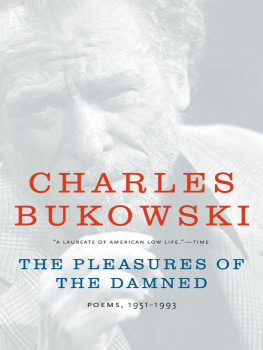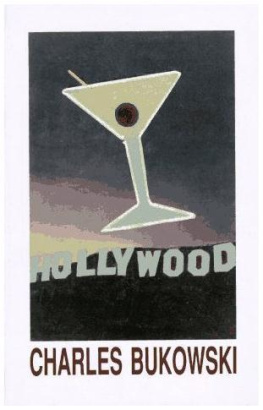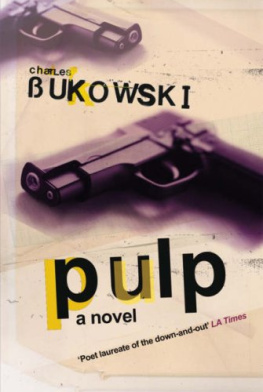Charles Bukowski - Ham on Rye
Here you can read online Charles Bukowski - Ham on Rye full text of the book (entire story) in english for free. Download pdf and epub, get meaning, cover and reviews about this ebook. year: 2007, publisher: Ecco, genre: Detective and thriller. Description of the work, (preface) as well as reviews are available. Best literature library LitArk.com created for fans of good reading and offers a wide selection of genres:
Romance novel
Science fiction
Adventure
Detective
Science
History
Home and family
Prose
Art
Politics
Computer
Non-fiction
Religion
Business
Children
Humor
Choose a favorite category and find really read worthwhile books. Enjoy immersion in the world of imagination, feel the emotions of the characters or learn something new for yourself, make an fascinating discovery.
- Book:Ham on Rye
- Author:
- Publisher:Ecco
- Genre:
- Year:2007
- Rating:5 / 5
- Favourites:Add to favourites
- Your mark:
- 100
- 1
- 2
- 3
- 4
- 5
Ham on Rye: summary, description and annotation
We offer to read an annotation, description, summary or preface (depends on what the author of the book "Ham on Rye" wrote himself). If you haven't found the necessary information about the book — write in the comments, we will try to find it.
Ham on Rye — read online for free the complete book (whole text) full work
Below is the text of the book, divided by pages. System saving the place of the last page read, allows you to conveniently read the book "Ham on Rye" online for free, without having to search again every time where you left off. Put a bookmark, and you can go to the page where you finished reading at any time.
Font size:
Interval:
Bookmark:
The Days Run Away Like Wild Horses Over the Hills (1969)
Post Office (1971)
Mockingbird Wish Me Luck (1972)
South of No North (1973)
Burning in Water, Drowning in Flame: Selected Poems 1955-1973 (1974)
Factotum (1975)
Love is a Dog from Hell (1977)
Women (1978)
You Kissed Lilly (1978)
play the piano drunk like a percussion instrument until the fingers begin to bleed a bit (1979)
Shakespeare Never Did This (1979)
Dangling in the Tournefortia (1981)
Ham on Rye (1982)
Bring Me Your Love (1983)
Hot Water Music (1983)
Theres No Business (1984)
War All the Time: Poems 1981-1984 (1984)
You Get So Alone At Times That It Just Makes Sense (1986)
The Movie: Barfly (1987)
The Roominghouse Madrigals: Early Selected Poems 1946-1966 (1988)
Hollywood (1989)
Septuagenarian Stew: Stories & Poems (1990)
The Last Night of the Earth Poems (1992)
Screams from the Balcony: Selected Letters 1960-1970 (1993)
Pulp (1994)
Living on Luck: Selected Letters 1960s-1970s (Volume 2) (1995)
Betting on the Muse: Poems & Stories (1996)
Bone Palace Ballet: New Poems (1997)
The Captain is Out to Lunch and the Sailors Have Taken Over the Ship (1998)
Reach for the Sun: Selected Letters 1978-1994 (Volume 3) (1999)
What Matters Most is How Well You Walk Through the Fire: New Poems (1999)
Open All Night: New Poems (2000)
Night Torn Mad with Footsteps: New Poems (2001)
Beerspit Night and Cursing: The Correspondence of Charles Bukowski & Sheri Martinelli 1960-1967 (2001)
Sifting Through the Madness for the Word, the Line, the Way: New Poems (2003)
The Flash of Lightning Behind the Mountain: New Poems (2004)
Slouching Toward Nirvana (2005)
Come On In! (2006)
The People Look Like Flowers At Last (2007)
CHARLES BUKOWSKI is one of Americas best-known contemporary writers of poetry and prose, and, many would claim, its most influential and imitated poet. He was born in Andernach, Germany, to an American soldier father and a German mother in 1920, and brought to the United States at the age of three. He was raised in Los Angeles and lived there for fifty years. He published his first story in 1944 when he was twenty-four and began writing poetry at the age of thirty-five. He died in San Pedro, California, on March 9, 1994, at the age of seventy-three, shortly after completing his last novel, Pulp (1994).
During his lifetime he published more than forty-five books of poetry and prose, including the novels Post Office (1971), Factotum (1975), Women (1978), Ham on Rye (1982), and Hollywood (1989). Among his most recent books are the posthumous editions of What Matters Most Is How Well You Walk Through the Fire (1999), Open All Night: New Poems (2000), Beerspit Night and Cursing: The Correspondence of Charles Bukowski and Sheri Martinelli 1960-1967 (2001), and The Night Torn Mad with Footsteps: New Poems (2001).
All of his books have now been published in translation in over a dozen languages and his worldwide popularity remains undiminished. In the years to come, Ecco will publish additional volumes of previously uncollected poetry and letters.
Visit www.AuthorTracker.com for exclusive information on your favorite HarperCollins author.

Australia
HarperCollins Publishers (Australia) Pty. Ltd.
25 Ryde Road (PO Box 321)
Pymble, NSW 2073, Australia
http://www.harpercollinsebooks.com.au
Canada
HarperCollins Publishers Ltd.
55 Avenue Road, Suite 2900
Toronto, ON, M5R, 3L2, Canada
http://www.harpercollinsebooks.ca
New Zealand
HarperCollinsPublishers (New Zealand) Limited
P.O. Box 1
Auckland, New Zealand
http://www.harpercollinsebooks.co.nz
United Kingdom
HarperCollins Publishers Ltd.
77-85 Fulham Palace Road
London, W6 8JB, UK
http://www.harpercollinsebooks.co.uk
United States
HarperCollins Publishers Inc.
10 East 53rd Street
New York, NY 10022
http://www.harpercollinsebooks.com
The first thing I remember is being under something. It was a table, I saw a table leg, I saw the legs of the people, and a portion of the tablecloth hanging down. It was dark under there, I liked being under there. It must have been in Germany. I must have been between one and two years old. It was 1922. I felt good under the table. Nobody seemed to know that I was there. There was sunlight upon the rug and on the legs of the people. I liked the sunlight. The legs of the people were not interesting, not like the tablecloth which hung down, not like the table leg, not like the sunlight.
Then there is nothingthen a Christmas tree. Candles. Bird ornaments: birds with small berry branches in their beaks. A star. Two large people fighting, screaming. People eating, always people eating. I ate too. My spoon was bent so that if I wanted to eat I had to pick the spoon up with my right hand. If I picked it up with my left hand, the spoon bent away from my mouth. I wanted to pick the spoon up with my left hand.
Two people: one larger with curly hair, a big nose, a big mouth, much eyebrow; the larger person always seeming to be angry, often screaming; the smaller person quiet, round of face, paler, with large eyes. I was afraid of both of them. Sometimes there was a third, a fat one who wore dresses with lace at the throat. She wore a large brooch, and had many warts on her face with little hairs growing out of them. Emily, they called her. These people didnt seem happy together. Emily was the grandmother, my fathers mother. My fathers name was Henry. My mothers name was Katherine. I never spoke to them by name. I was Henry, Jr. These people spoke German most of the time and in the beginning I did too.
The first thing I remember my grandmother saying was, I will bury all of you! She said this the first time just before we began eating a meal, and she was to say it many times after that, just before we began to eat. Eating seemed very important. We ate mashed potatoes and gravy, especially on Sundays. We also ate roast beef, knockwurst and sauerkraut, green peas, rhubarb, carrots, spinach, string beans, chicken, meatballs and spaghetti, sometimes mixed with ravioli; there were boiled onions, asparagus, and every Sunday there was strawberry shortcake with vanilla ice cream. For breakfasts we had french toast and sausages, or there were hotcakes or waffles with bacon and scrambled eggs on the side. And there was always coffee. But what I remember best is all the mashed potatoes and gravy and my grandmother, Emily, saying, I will bury all of you!
She visited us often after we came to America, taking the red trolley in from Pasadena to Los Angeles. We only went to see her occasionally, driving out in the Model-T Ford.
I liked my grandmothers house. It was a small house under an overhanging mass of pepper trees. Emily had all her canaries in different cages. I remember one visit best. That evening she went about covering the cages with white hoods so that the birds could sleep. The people sat in chairs and talked. There was a piano and I sat at the piano and hit the keys and listened to the sounds as the people talked. I liked the sound of the keys best up at one end of the piano where there was hardly any sound at allthe sound the keys made was like chips of ice striking against one another.
Will you stop that? my father said loudly.
Let the boy play the piano, said my grandmother.
My mother smiled.
That boy, said my grandmother, when I tried to pick him up out of the cradle to kiss him, he reached up and hit me in the nose!
Font size:
Interval:
Bookmark:
Similar books «Ham on Rye»
Look at similar books to Ham on Rye. We have selected literature similar in name and meaning in the hope of providing readers with more options to find new, interesting, not yet read works.
Discussion, reviews of the book Ham on Rye and just readers' own opinions. Leave your comments, write what you think about the work, its meaning or the main characters. Specify what exactly you liked and what you didn't like, and why you think so.

